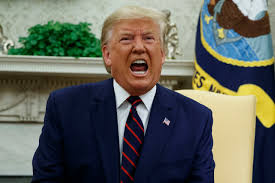Trump's Inglorious Demise and the Future of US Foreign Policy

By all accounts, Donald Trump will go down in history as one of, if not the, worst president in US history, who has the sole distinction of being impeached twice and censored by the American social media in the waning days of his presidency. After upending the international order for four years, Trump's last hurrah was to disrupt the American democratic process, by inciting his supporters to storm the US Congress to disrupt the certification of Joe Biden's victory, a brazen abuse of his position that has clearly backfired on him, in light of the stream of defections from the White House, the Republican Party, and the worldwide condemnation of his dictatorial transgression that has marred the image of American democracy for sometime to come -- the diminishing prestige of United States as an abode of liberal democracy will likely continue, notwithstanding the present polarization, tensions, and instabilities reflected in the unprecedented attack on Congress directed by the White House.
While it remains to be seen if the Democrat-led attempt to force Trump out of office before his scheduled departure on January 20th will bear fruit, even short of achieving the desired result, this initiative simply adds to Trump's inglorious exit. This does not necessarily mean the end of Trumpism, which will likely sustain itself in a reduced capacity, perhaps by using new platforms in the future, yet it is abundantly clear that as a viable alternative for national leadership, the Trump phenomenon has run its course and come to a crushing finish, largely due to Trump's own self-inflicted wounds.
Thus, with the initial seducement of Trump (ism), as an emerging right-wing nationalistic populism now fully dissipated by the litany of Trump's anti-democratic tactics backfiring on him, the stage is set for the renewal of liberal democracy in both the US and elsewhere in the Western world, in other words, the political brand has lost its luster and this is a net plus for Western democracy.
Also, Trump's crisis finale is a plus for the external objects and victims of his repressive and autocratic policy and countries such as Iran, Venezuela, and Cuba now have cause to rejoice the prospect of a greater American awareness of the close link between Trump's dictatorial behavior at home and abroad, in a word, Trump's final chapter steeped in illegitimacy renders any attempt to sustain his foreign policies such as those toward Iran and its allies in the region rather problematic. The big jolt to the American polity delivered by the Trump-led insurrection on January 6 exacting several lives is bound to have serious repercussions with respect to the future of American foreign policy.
In the Middle East in particular, where Trump wrote blank checks to the expansionist Israel on the one hand and, on the other to the rights abusive Saudi leaders, who did not receive even a slap on the wrist for their role in the gruesome murder of the dissent journalist Jamal Khashoghi, winds of change are inevitable. Biden has pledged to return the US to Iran nuclear agreement and to revisit the US-Saudi ties, and chances are, even Israel will be subjected to the requirements of a new US policy on the Middle East requiring greater sensitivity to Palestinian rights. These changes may come incrementally, yet there is no doubt that the recent events inside US above-mentioned fuel the pressure to reconsider many of Trump's foreign initiatives, which have brought US and Iran to the brink of war. Put in other words, had Trump not gone too far and miscalculated how his charge against the Congress would unleash a major political setback for him and his combative brand of politics, then it would be relatively easier to defend his foreign policy legacy.
Yet, there is no tall wall between domestic and foreign policy and, henceforth, we may witness a grown attrition of Trump's foreign and Middle East legacy in the months to come, as the new Biden administration sets out to heal the extensive damages wrought by its predecessor. With the expectation of an orderly, and peaceful, transition of power gone in smoke as a result of the January 6 event in US Congress, prompting a new article of impeachment, what is also indirectly impeached is Trump's coercive foreign policy that targeted Iran for an unjust and reprehensible sanctions strategy that was tantamount to a systematic abuse of human rights of the Iranian people. It is now up to the upcoming President Biden to provide the leadership and vision to end this egregious injustice to Iran and thus set the troubled US-Iran relations on a healthy path again, premised in the cooperative logic which is clearly discernible in the 2015 Iran nuclear agreement.

